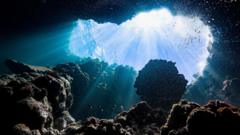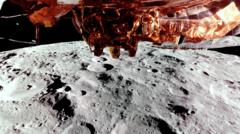Recent findings show that metal nodules on the ocean floor generate oxygen, a phenomenon prompting researchers to investigate deep-sea ecosystems and its implications for extraterrestrial life.
Dark Oxygen Discovery Could Change Search for Life Beyond Earth

Dark Oxygen Discovery Could Change Search for Life Beyond Earth
Researchers explore how dark ocean oxygen production could lead to life in other worlds
Scientists have unveiled a groundbreaking discovery revealing that oxygen can be produced in the absence of sunlight on Earth’s ocean floor, leading to significant implications for the search for life on other planets. The team, comprising marine researchers led by Prof. Andrew Sweetman, found that metal deposits located on the seabed generate oxygen from seawater, challenging long-held views that oxygenation was solely the result of photosynthesis, a process dependent on sunlight.
Following this revelation, plans have emerged to delve deeper into the planet's lesser-explored oceanic regions, particularly areas exceeding 10 kilometers deep. The researchers aim to gather more data to confirm whether similar oxygen-producing processes could exist on celestial bodies that harbor water, such as moons and planets throughout our solar system. Prof. Sweetman noted that discussions have already commenced with NASA experts to assess the broader implications of their findings not just for Earth, but for astrobiology overall.
The initial discovery, which occurred during explorations between Hawaii and Mexico, has sparked controversy within the scientific community and among deep-sea mining corporations. Critics from various factions questioned the rigor of the research methodology, suggesting the observed oxygen levels reflected equipment malfunction rather than biological activity. However, Prof. Sweetman remains firm in the validity of their experimental results, promising that forthcoming missions will provide concrete evidence.
The concept that oxygen could be generated in the absence of sunlight raises important questions regarding deep-sea ecosystems and what life forms might thrive in such environments. It also links closely to growing concerns over seabed mining practices, as the naturally occurring nodules are sought after by companies for the precious metals they contain, essential for evolving technologies. As environmental organizations rally against the potential ecological consequences of these mining operations, over 900 marine scientists from 44 countries have signed petitions advocating for a suspension of such activities until further understanding of the deep-sea ecosystem is established.
“We need to analyze the potential impact on life forms derived from these dark ocean processes before any mining decisions can be responsibly undertaken,” stressed Prof. Sweetman at a recent press conference. These important investigations not only wrestle with the ethics of resource extraction but also position our understanding of life’s adaptability in the universe on the threshold of transformative exploration.
Following this revelation, plans have emerged to delve deeper into the planet's lesser-explored oceanic regions, particularly areas exceeding 10 kilometers deep. The researchers aim to gather more data to confirm whether similar oxygen-producing processes could exist on celestial bodies that harbor water, such as moons and planets throughout our solar system. Prof. Sweetman noted that discussions have already commenced with NASA experts to assess the broader implications of their findings not just for Earth, but for astrobiology overall.
The initial discovery, which occurred during explorations between Hawaii and Mexico, has sparked controversy within the scientific community and among deep-sea mining corporations. Critics from various factions questioned the rigor of the research methodology, suggesting the observed oxygen levels reflected equipment malfunction rather than biological activity. However, Prof. Sweetman remains firm in the validity of their experimental results, promising that forthcoming missions will provide concrete evidence.
The concept that oxygen could be generated in the absence of sunlight raises important questions regarding deep-sea ecosystems and what life forms might thrive in such environments. It also links closely to growing concerns over seabed mining practices, as the naturally occurring nodules are sought after by companies for the precious metals they contain, essential for evolving technologies. As environmental organizations rally against the potential ecological consequences of these mining operations, over 900 marine scientists from 44 countries have signed petitions advocating for a suspension of such activities until further understanding of the deep-sea ecosystem is established.
“We need to analyze the potential impact on life forms derived from these dark ocean processes before any mining decisions can be responsibly undertaken,” stressed Prof. Sweetman at a recent press conference. These important investigations not only wrestle with the ethics of resource extraction but also position our understanding of life’s adaptability in the universe on the threshold of transformative exploration.

















